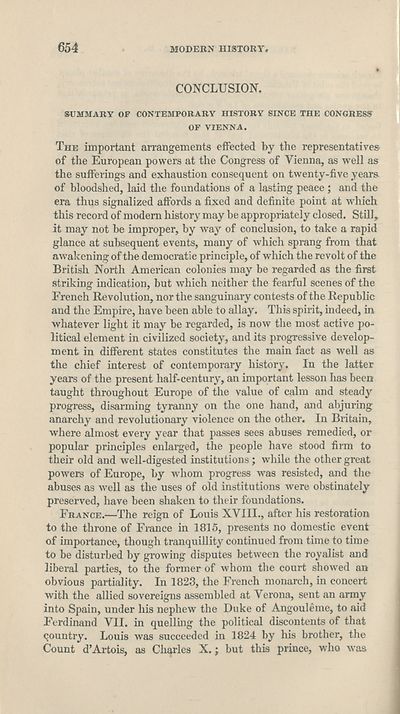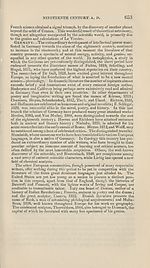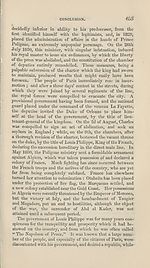Download files
Complete book:
Individual page:
Thumbnail gallery: Grid view | List view

654
MODERN HISTORY.
CONCLUSION.
SUMMARY OF CONTEMPORARY HISTORY SINCE THE CONGRESS
OF VIENNA.
The important arrangements effected by the representatives
of the European powers at the Congress of Vienna, as well as
the sufferings and exhaustion consequent on twenty-five years
of bloodshed, laid the foundations of a lasting peace ; and the
era thus signalized affords a fixed and definite point at which
this record of modern history may be appropriately closed. Still,
it may not be improper, by way of conclusion, to take a rapid
glance at subsequent events, many of which sprang from that
awakening of the democratic principle, of which the revolt of the
British North American colonies may be regarded as the first
striking indication, but which neither the fearful scenes of the
French Revolution, nor the sanguinary contests of the Republic
and the Empire, have been able to allay. This spirit, indeed, in
whatever light it may be regarded, is now the most active po¬
litical element in civilized society, and its progressive develop¬
ment in different states constitutes the main fact as well as
the chief interest of contemporary history. In the latter
years of the present half-century, an important lesson has been
taught throughout Europe of the value of calm and stead}'
progress, disarming tyranny on the one hand, and abjuring
anarchy and revolutionary violence on the other. In Britain,
where almost every year that passes sees abuses remedied, or
popular principles enlarged, the people have stood firm to
their old and well-digested institutions ; while the other great
powers of Europe, by whom progress was resisted, and the
abuses as well as the uses of old institutions were obstinately
preserved, have been shaken to their foundations.
France.—The reign of Louis XVIII., after his restoration
to the throne of France in 1815, presents no domestic event
of importance, though tranquillity continued from time to time
to be disturbed by growing disputes between the royalist and
liberal parties, to the former of whom the court showed an
obvious partiality. In 1823, the French monarch, in concert
with the allied sovereigns assembled at Verona, sent an army
into Spain, under his nephew the Duke of Angouleme, to aid
Ferdinand VII. in quelling the political discontents of that
qountry. Louis was succeeded in 1824 by his brother, the
Count d’Artois, as Charles X.; but this prince, who was
MODERN HISTORY.
CONCLUSION.
SUMMARY OF CONTEMPORARY HISTORY SINCE THE CONGRESS
OF VIENNA.
The important arrangements effected by the representatives
of the European powers at the Congress of Vienna, as well as
the sufferings and exhaustion consequent on twenty-five years
of bloodshed, laid the foundations of a lasting peace ; and the
era thus signalized affords a fixed and definite point at which
this record of modern history may be appropriately closed. Still,
it may not be improper, by way of conclusion, to take a rapid
glance at subsequent events, many of which sprang from that
awakening of the democratic principle, of which the revolt of the
British North American colonies may be regarded as the first
striking indication, but which neither the fearful scenes of the
French Revolution, nor the sanguinary contests of the Republic
and the Empire, have been able to allay. This spirit, indeed, in
whatever light it may be regarded, is now the most active po¬
litical element in civilized society, and its progressive develop¬
ment in different states constitutes the main fact as well as
the chief interest of contemporary history. In the latter
years of the present half-century, an important lesson has been
taught throughout Europe of the value of calm and stead}'
progress, disarming tyranny on the one hand, and abjuring
anarchy and revolutionary violence on the other. In Britain,
where almost every year that passes sees abuses remedied, or
popular principles enlarged, the people have stood firm to
their old and well-digested institutions ; while the other great
powers of Europe, by whom progress was resisted, and the
abuses as well as the uses of old institutions were obstinately
preserved, have been shaken to their foundations.
France.—The reign of Louis XVIII., after his restoration
to the throne of France in 1815, presents no domestic event
of importance, though tranquillity continued from time to time
to be disturbed by growing disputes between the royalist and
liberal parties, to the former of whom the court showed an
obvious partiality. In 1823, the French monarch, in concert
with the allied sovereigns assembled at Verona, sent an army
into Spain, under his nephew the Duke of Angouleme, to aid
Ferdinand VII. in quelling the political discontents of that
qountry. Louis was succeeded in 1824 by his brother, the
Count d’Artois, as Charles X.; but this prince, who was
Set display mode to:
![]() Universal Viewer |
Universal Viewer | ![]() Mirador |
Large image | Transcription
Mirador |
Large image | Transcription
| Antiquarian books of Scotland > Education > Elements of universal history on a new and systematic plan > (674) |
|---|
| Permanent URL | https://digital.nls.uk/127588228 |
|---|
| Description | Thousands of printed books from the Antiquarian Books of Scotland collection which dates from 1641 to the 1980s. The collection consists of 14,800 books which were published in Scotland or have a Scottish connection, e.g. through the author, printer or owner. Subjects covered include sport, education, diseases, adventure, occupations, Jacobites, politics and religion. Among the 29 languages represented are English, Gaelic, Italian, French, Russian and Swedish. |
|---|

